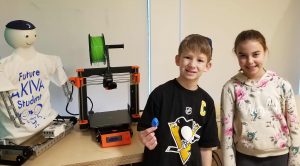
Rabbi Eric Grossman, Head of School
Chanukkah is one of my favorite Jewish holidays, but not for the reasons you may suspect. While I enjoy the foods, songs, and celebrations associated with the festival, every other Jewish holiday also has its own unique culinary, musical, and ritual elements. What makes Chanukkah special is that, unlike the other Jewish holidays, the Festival of Lights is entirely a product of human creativity.
Rosh Hashanah, Yom Kippur, Sukkot, Purim, Passover, and Shavuot—all of these holidays have their roots in the Jewish Bible. While our rabbis developed customs and laws around these festivals, they are all based on Scripture. Chanukkah, on the other hand, was instituted by our sages as a response to events they witnessed. After the miracle of the Maccabees’ victory over the Seleucid Greeks, and following the miracle of the oil that lasted for eight days, our rabbis created the ritual of lighting the Chanukkah menorah, and composed benedictions and hymns to sanctify and memorialize these events for future generations.

Akiva students in our Innovation Lab holding a dreidel created on the 3D printer.
Chanukkah is thus the holiday that celebrates the role of human creativity in the evolution of Judaism. Rabbi David Hartman z’l, the founder of the Akiva School, was the foremost proponent of the importance of religious creativity in his generation of traditional rabbis. Akiva School was formed to be an incubator of creativity, and to inspire young Jewish boys and girls to innovate and invent. Today, we proudly continue this mission. Our school’s Innovation Lab is the latest iteration of our message of creativity. When I walk through the lab I am inspired to see students of all ages exploring, innovating, and creating, in the tradition of our rabbis. The type of innovative thinking that the we foster in our lab carries over to all of our subjects and disciplines. Innovation may be trained in Science, Technology, Engineering, Arts, and Math, but the mind so trained will then continue to innovate in French, English, Hebrew and beyond.
When our sages wrote the blessings on the Chanukkah candles, they formulated the first blessing thus:
Blessed are You, Lord our God, King of the Universe, who sancitified us with His commandments and commanded us to light the Chanukkah light.
If the rabbis fabricated the rituals of Chanukkah from whole cloth, how could they aver that God had commanded us to light the Chanukkah lights? Since Chanukkah is not mentioned in the Bible, God certainly gave us no such commandment!
The answer is that the rabbis who wrote these words believed that God had commanded them to perpetuate Judaism through human creativity. Therefore, when creating new blessings or rites, we can rightly say that it is God’s command—for God has commanded us to utilize our Divinely endowed creativity to perpetuate the Jewish people and advance the world.












